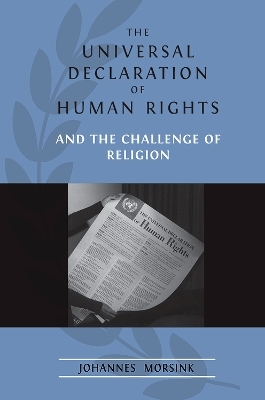
The Universal Declaration Of Human Rights And The Challenge Of Religion
Seiten
2017
University of Missouri Press (Verlag)
978-0-8262-2084-4 (ISBN)
University of Missouri Press (Verlag)
978-0-8262-2084-4 (ISBN)
- Titel z.Zt. nicht lieferbar
- Versandkostenfrei innerhalb Deutschlands
- Auch auf Rechnung
- Verfügbarkeit in der Filiale vor Ort prüfen
- Artikel merken
Discusses the role of religion in the collective response to the horrors of the Holocaust. It shows that the benign secularism of the UDHR was crafted with the cooperation of all of the world’s major religions. The book also defends this liberal view against conservative and literalist religious forces in the United States and in Muslim majority countries.
Horrified by the carnage and devastation of World War II, in 1948 the United Nations General Assembly adopted the Universal Declaration of Human Rights (UDHR). Because of its secular orientation, the UDHR has faced challenges from the world’s religions, both when it was crafted and in subsequent political and legal struggles.Nevertheless, the morality of human rights is no longer controlled by the forces of either statecraft or religion. It is an independent moral voice in world afairs. Part one of this book discusses the role of religion in the collective response to the horrors of the Holocaust. It shows that the benign secularism of the UDHR was crafted with the cooperation of all of the world’s major religions. Part two defends this liberal view against conservative and literalist religious forces in the United States and in Muslim majority countries. The final part of the book explores the suggestion of the UDHR’s drafters that our consciences and reasoning powers give us independent access into the domain of inherent human rights.
Horrified by the carnage and devastation of World War II, in 1948 the United Nations General Assembly adopted the Universal Declaration of Human Rights (UDHR). Because of its secular orientation, the UDHR has faced challenges from the world’s religions, both when it was crafted and in subsequent political and legal struggles.Nevertheless, the morality of human rights is no longer controlled by the forces of either statecraft or religion. It is an independent moral voice in world afairs. Part one of this book discusses the role of religion in the collective response to the horrors of the Holocaust. It shows that the benign secularism of the UDHR was crafted with the cooperation of all of the world’s major religions. Part two defends this liberal view against conservative and literalist religious forces in the United States and in Muslim majority countries. The final part of the book explores the suggestion of the UDHR’s drafters that our consciences and reasoning powers give us independent access into the domain of inherent human rights.
Johannes Morsin is professor of political philosophy, emeritus at Drew University and the author of three books, most recently Inherent Human Rights: Philosophical Roots of the Universal Declaration. He lives in Madison, NJ USA.
| Erscheinungsdatum | 13.07.2016 |
|---|---|
| Verlagsort | Missouri |
| Sprache | englisch |
| Maße | 152 x 229 mm |
| Gewicht | 760 g |
| Themenwelt | Geschichte ► Teilgebiete der Geschichte ► Militärgeschichte |
| Geisteswissenschaften ► Religion / Theologie | |
| Recht / Steuern ► EU / Internationales Recht | |
| Recht / Steuern ► Rechtsgeschichte | |
| Sozialwissenschaften ► Politik / Verwaltung | |
| ISBN-10 | 0-8262-2084-3 / 0826220843 |
| ISBN-13 | 978-0-8262-2084-4 / 9780826220844 |
| Zustand | Neuware |
| Informationen gemäß Produktsicherheitsverordnung (GPSR) | |
| Haben Sie eine Frage zum Produkt? |
Mehr entdecken
aus dem Bereich
aus dem Bereich
neueste Manipulationstechniken als Waffengattung der NATO
Buch | Softcover (2023)
Westend (Verlag)
24,00 €


